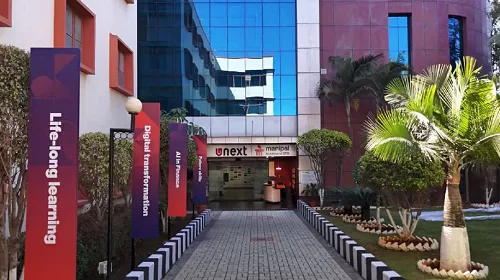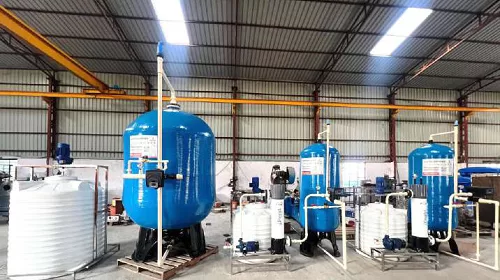Water sustainability is a critical challenge in today’s world, particularly for large institutions with extensive infrastructure and high consumption rates. In this context, technology has emerged as a game-changer, enabling smarter and more efficient water management practices. SpaceBasic, Asia’s largest B2B SaaS AI-powered platform, is at the forefront of this revolution, empowering universities across Southeast Asia to achieve remarkable cost savings and operational efficiency. This case study explores how SpaceBasic’s technology has transformed water management at Unext – Manipal Academy of BFSI, setting a benchmark for campus sustainability.
While the edtech landscape is crowded with solutions aimed at classroom learning and management, SpaceBasic stands apart as the operational backbone for modern universities by targeting operational challenges. From student housing and pioneering cafeteria workflows to water management and integrated access controls, the platform ensures that both students and staff can focus on what truly matters: success and engagement.
UNDERSTANDING WATER USAGE AT UNEXT-MANIPAL ACADEMY OF BFSI (MABFSI) CAMPUS
MABFSI, a fully residential campus, relies heavily on water, consuming approximately 1.1 to 1.3 crore liters monthly, or nearly 15-16 crore liters annually. This significant usage supports various needs across the campus:
- Student Needs: Water is used for bathing, laundry, drinking, and cooking in hostel kitchens.
- Wastewater Recycling: A 500 KLD (Kilo Liters per Day) Sewage Treatment Plant (STP) recycles wastewater, ensuring it is reused for non-potable applications and no drop goes to waste. This STP is an initiative of Unext-Manipal Academy of BFSI.
- Non-Potable Uses: RO reject water is repurposed for flushing and gardening, maximizing utility.
- Staff Needs: Daily activities in academic blocks, including dining and restroom use, also contribute to overall consumption.
Given the vast water requirements, managing this resource effectively is critical. The campus’s traditional water management practices were robust, however labor-intensive to maintain registers. These processes were not only time-consuming but also prone to errors, making it difficult to manually recheck to ensure accurate tracking and optimization.
Recognizing the need for improvement, the campus sought a smarter, technology-driven solution to streamline operations, minimize wastage, and optimize consumption. By integrating automation into water management, the campus has paved the way for sustainable practices that conserve resources and enhance operational efficiency, setting an example for other large institutions.
THE TRANSITION FROM MANUAL TO AUTOMATED SYSTEMS
Prior to adopting SpaceBasic, water management at the campus involved labor-intensive manual processes that consumed significant time and effort.
The traditional methods included:
- Manual Tracking: Water inflow was recorded in handwritten logs and later transferred to excel sheets. This process was not only time-consuming but also prone to errors and needed to be multiple times verified to ensure accuracy of data.
- Tank Measurement: Security guards had to make manual note of tankers capacity in registers, which was both inefficient and too manual.
- Data Compilation: Weekly and monthly data compilation was required to analyze consumption, a process fraught with labour intensive data entry and manual accuracy checks.
SPACEBASIC’S AUTOMATION COMPLETELY TRANSFORMED THIS WORKFLOW. KEY FEATURES OF THE NEW SYSTEM INCLUDE:
QR Code Integration
- Each water tanker is pre-registered with a QR code containing master data such as vehicle capacity and details.
- Scanning the QR code via the SpaceBasic app provides instant access to vehicle information, eliminating manual verification.
Automated Data Collection
- Daily data collection ensures real-time tracking of water inflow and consumption.
- Automated excel sheet dumps provide an accurate snapshot of water usage, significantly reducing manual effort.
Enhanced Accuracy and Efficiency
- The elimination of manual errors in data entry ensures a reliable record of water consumption.
- Calibration of tanker volumes accounts for discrepancies in capacity, providing more precise data.
- Real-Time Insights
- Administrators can monitor water usage in real-time, enabling quicker decision-making and proactive problem-solving.
KEY IMPROVEMENTS ACHIEVED WITH SPACEBASIC
The implementation of SpaceBasic at Unext-Manipal Academy of BFSI resulted in several tangible and intangible benefits. These include
Streamlined Automated Operations
- Automation reduced the tedious process of logging data manually, freeing up staff for other critical tasks.
- Administrators can now access water usage data at their fingertips, ensuring better oversight and control.
Vendor Management
- Water vendors must pre-register new vehicles to receive QR codes, ensuring no unauthorized vehicles enter the campus.
- This system also helps track the performance and reliability of vendors over time.
Data-Driven Decision Making
- Automated insights enable the campus to track per capita consumption and daily usage trends.
- The potential for integrating AI analytics offers the ability to detect wastage patterns, optimize consumption, and generate actionable alerts.
COMMENTING ON THE BENEFITS, ELANCHEZHIYAN GANESAN, VICE PRESIDENT OF CAMPUS INFRASTRUCTURE AND STUDENT SERVICES AT UNEXT-MANIPAL ACADEMY OF BFSI, SAID
- “MABFSI has long been at the forefront of adopting innovative technologies that not only drive progress but also foster positive change for both people and the planet. Sustainability is at the heart of our operations. With our campus consuming nearly 20 crore liters of water annually, we recognized the need for innovative solutions to manage this critical resource efficiently. By leveraging SpaceBasic’s technology, we have not only automated our water management processes but also significantly reduced wastage, improved accuracy, and optimized usage. This initiative, coupled with our efforts in recycling wastewater and addressing food waste in campus cafeterias, reflects our commitment to building a better tomorrow for our students and staff”.
CHALLENGES AND THEIR RESOLUTION
Transitioning to an automated system was not without its challenges. Some of the hurdles faced during implementation and their resolutions include
- Enforcing a policy requiring vendors to provide inputs a day in advance.
QR Code Implementation
- Vendors introducing new vehicles without prior notice faced delays in obtaining QR codes. This challenge was addressed by
Internet Connectivity
- Occasional network issues during QR code scanning were mitigated by setting up backup systems and offline modes where feasible.
Borewell Water Tracking
- Borewell water is still tracked manually, as automated integration is yet to be implemented. Plans are in place to address this gap in the near future.
Despite these initial challenges, the system has now stabilized, with streamlined processes ensuring smooth operations.
REAL-LIFE APPLICATIONS AND INSIGHTS
The adoption of SpaceBasic has not only transformed water management but also provided valuable insights into campus operations. Key examples include
Consumption Trends
- Detailed data on water usage enables the campus to identify trends and implement measures to optimize consumption.
- For example, educating students about conservation based on consumption patterns has led to behavioral changes that reduce wastage.
Operational Efficiency
- The automation of repetitive tasks has reduced workload and allowed staff to focus on higher-value activities.
Future-Ready Infrastructure
- The automation of repetitive tasks has reduced workload and allowed staff to focus on higher-value activities.
Future-Ready Infrastructure
- By integrating advanced technology, the campus is better equipped to scale operations and handle increasing demands.
FUTURE POTENTIAL
- SpaceBasic’s water management system has paved the way for further advancements in campus sustainability. Some of the future possibilities include
AI Integration
- Advanced analytics could provide automated alerts on consumption thresholds and identify wastage patterns in real time.
- Predictive modeling could help forecast future water requirements and optimize procurement strategies.
Expanded Applications
- The system could be extended to other areas of campus operations, such as tracking staff transportation or monitoring energy usage.
- Real-time tracking of staff transportation could provide valuable insights into campus logistics and reduce inefficiencies.
Smart Resource Allocation
- Integrating data from multiple sources could enable the campus to allocate resources more effectively, further enhancing sustainability.
CONCLUSION
The adoption of SpaceBasic at Unext-Manipal Academy of BFSI highlights the transformative potential of technology in achieving water sustainability. By automating processes, reducing manual errors, and enabling data-driven decisions, SpaceBasic has set a precedent for campuses striving for environmental stewardship. The system’s ability to streamline operations, enhance accuracy, and provide actionable insights demonstrates its value as a critical tool for modern institutions. As water scarcity becomes an increasingly pressing issue worldwide, solutions like SpaceBasic offer a scalable and efficient pathway to sustainable water management. MABFSI’s success story serves as an inspiring example for other institutions, showcasing the immense potential of technology to revolutionize campus sustainability.
By Madhavi Shankar, CEO and Co-Founder, SpaceBasic





